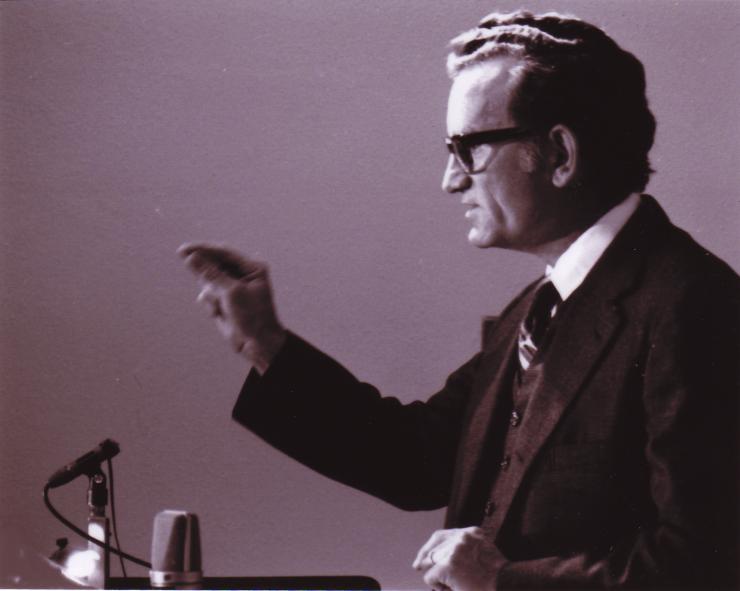Lecture Honors Dr. Joseph C. Schoolar

Joseph Clayton Schoolar, M.D., Ph.D. (1928-2013) was professor of Pharmacology and Psychiatry at Baylor College of Medicine. He was born and grew up in the Mississippi Delta. At 17 he joined the U.S. Army and was assigned to Clemson College as an engineering student. He was then transferred to the Army Japanese Language School at the University of Minnesota. After completing his training at the University of Minnesota, he served in General Douglas MacArthur’s Headquarters.
Upon his discharge from the Army, he entered the University of Tennessee, receiving his AB in 1950 and MS (Cell Physiology) in 1952. His research for the master’s degree involved the effects of x-radiation on living tissue, particularly the central nervous system. He then joined the laboratory of Dr. John Rust in Oak Ridge, Tenn., working on the effects of ionizing radiation on living systems, again emphasizing the CNS.
In 1954, he moved to the University of Chicago as a graduate student under Dr. Lloyd Roth. His dissertation focus was the blood-brain barrier, and with Dr. Charles Barlow, he developed an autoradiographic technique for use in a variety of studies on the brain, chiefly drug distribution and cerebral blood flow. He was awarded a Doctorate of Philosophy degree in Pharmacology in 1957, and a Doctorate of Medicine in 1960.
After a general rotation internship at the University of Chicago, Dr. Schoolar moved to Baylor College of Medicine for residency training in psychiatry. He then joined the staff of the Texas Research Institute of Mental Sciences as well as the Baylor faculty, the latter jointly in the Departments of Pharmacology and Psychiatry. His work has been in research, training, and clinical practice in psychopharmacology and psychiatry.
2024 Schoolar Lecture
We are pleased to announce our 2024 Schoolar Lecture, Dr. Brian Shoichet, Professor of Pharmaceutical Chemistry at the University of California, San Francisco.
Dr. Shoichet works to discover chemical reagents that can illuminate biological problems. He is a leader in the area of structure-based ligand discovery wherein protein structures are exploited to predict small molecule ligands as potential therapeutic leads. His laboratory has developed computational methods for ligand discovery and applied these to G-Protein Coupled Receptors (GPCRs), which are the largest family of signaling receptors in humans.
The 2024 Schoolar Lecture will take place at 4 p.m. on November 14, 2024, in Alkek Auditorium N315.
Previous Lectures
- Bryan Roth, M.D., Ph.D., “New Insights into Psychiatric Drug Actions”
- John Krystal, M.D. “Targeting Glutamate in Psychiatric Disease”
- Marina Picciotto, Ph.D. “Developmental effects of nicotine receptor signaling: epigenetic regulation of neuronal morphology”
- Eric Gouaux, Ph.D. "How molecules modulate mood: Chemical principles of antidepressant and psychostimulant action at biogenic amine transporters"
- F. Ivy Carroll, Ph.D. "Design and Development of Compounds for Substance Abuse Research”
- Herbert Meltzer, M.D. "Translating Clinical and Basic Research into Novel Treatments for Psychosis and Cognitive Impairment: Alive and Well in the 21st Century"
- Carol Tamminga, M.D. "Schizophrenia as a Learning and Memory Disorder"
- Palmer Taylor, Ph.D. "Structure-guided drug design in the cholinergic nervous system: using the very target of drug action as the microscopic template for development of novel molecules in therapy"
- Charles O'Brien, M.D., Ph.D. "A Genomic Approach to Alcoholism"
- David A. Lewis, M.D. "Translating Neural Circuits into Novel Therapeutics for Schizophrenia"
- Eric J. Nestler, M.D., Ph.D. "New Insight into the Molecular Basis of Depression"
- Thomas R. Kosten, M.D. "Innovation in Pharmacotherapy of Substance Abuse"








